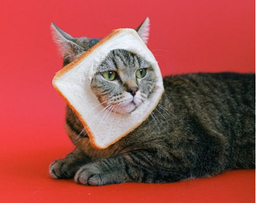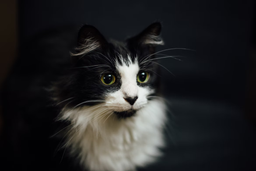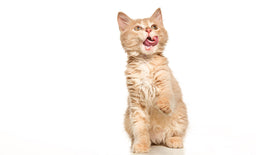Can cats eat honey, or is it a honeytrap? Untamed tunes into the buzz!
Honey is more than a natural sweetener. Its healing properties have made it a valid part of traditional medicine for centuries. While this delightful product is great health food for humans, can cats eat honey?
According to relevant studies, felines don’t have the taste receptors to detect sweetness. Cats don’t care about the taste of honey, and if they lick it, it’s almost always out of curiosity. Many cat parents give their kitties honey because of its rich antioxidant profile. Some even use it as a regular health supplement to manage sugar levels in diabetic cats. It is a wrong move as cats are hardcore carnivores, and anything other than meat can be harmful.
Why cats and honey don’t bee-long together
Honey isn’t toxic to cats, but it’s not a feline superfood either. The nutrient composition of honey is 80% carbohydrate (sugar) and 18% water, while proteins, vitamins, and minerals constitute only 2%. Here’s an estimated nutrient profile of 20 grams of assorted honey:
|
Nutrient marker |
Amount |
|
|
Carbohydrate |
Fructose |
8.5 grams |
|
Glucose |
7.0 grams |
|
|
Protein |
0.08 grams |
|
|
Moisture |
3.5 grams |
|
|
Fat |
Nil |
|
|
Calories |
61 calories |
|
When you compare these figures to your cat’s nutritional needs, honey is practically useless. The ideal feline diet should be high in animal protein, moderate in fat, and super low in carbs.
Honey is a torrent of carbohydrates in the form of natural sugar, and cats have a hard time digesting them. Your cat’s liver doesn’t produce glucokinase, which helps with the breakdown of glucose and fructose. Felines can handle a lick of honey, but consuming it in large portions will overstress their digestive system and lead to gagging, regurgitation, vomiting, and diarrhoea.

I like you, hooman, not your weird omnivore breakfast. I would love me some meat right meow!
Source: Daniela Constantini
Besides gastrointestinal problems, the calorie surplus in honey is another cause for concern. Most indoor cats are neutered or spayed and have moderate daily caloric needs. When consumed regularly, even a spoonful of honey provides too many calories and leads to gradual weight gain, while exposure to sugar can trigger tooth decay. This also applies to other confectionery products like chocolate, ice cream, cake, as well as sweetened milk or yoghurt—they’re no good for kitties.
What about the medicinal use of honey—does it apply to felines?
In human nutrition, honey is celebrated for its antibacterial and anti-inflammatory qualities. The viscous liquid has also crept into the feline diet, mostly as an unverified home remedy for:
- Diabetes mellitus
- Anorexia
- Allergies
- Wound healing
Can honey help manage feline diabetes?
Diabetic cats don’t produce enough insulin, which slows down the conversion of food to energy in their bodies. Kitties with uncontrolled diabetes are always hungry, so some people start giving them carb-heavy snacks like honey, rice, and bread to spike their energy levels. It is a dangerous hack as feline diabetes can only be controlled with prescription medicines and a regular diet of wet food with whole meat and no sugar. Managing feline diabetes with home remedies can lead to ketoacidosis and death.
While honey cannot prevent or treat diabetes, the opposite is true—overfeeding the snack can cause diabetes in healthy cats.
Can honey help skinny kitties gain healthy weight?
Honey can help cats gain weight but in an unhealthy manner. When cats eat excess carbohydrates, their body converts and stores them as fat. Honey and other carb-rich products will raise your skinny kitty’s body fat percentage without boosting the muscle mass.
If you have a cat who needs meat on their bones, you should feed them biologically appropriate high-protein food like meat, fish, and organs. Animal proteins promote healthy weight gain by increasing muscle tone and bone density.

Nectar of life for humans, but biologically unsuitable for cats—kitties and honey were never meant to bee…
Source: Mareefe
Does honey soothe allergies in cats?
Honey’s anti-inflammatory properties can theoretically relieve some symptoms of allergies in cats, such as itchy eyes and throat, paw swelling, and inflamed, red skin, but there are no relevant scientific studies on its effectiveness yet.
The best way to combat allergies in cats is to recognise the allergen. It can be anything from food to houseplants and should be kept away from your kitty. Some cats are also allergic to the pollen content in honey, so it’s better not to use it as a remedy.
You can recognise an allergic reaction by the following symptoms:
- Wheezing
- Nasal drip
- Irritated skin and eyes
- Lack of appetite
- Unnatural shedding
- Barfing
Can honey support the wound-healing process in cats?
Honey has antioxidants like flavonoids and phenolic acids that promote wound healing in humans when used orally or topically. Let’s examine these remedies for felines:
- Honey as an antioxidant supplement—Honey has many amino acids and B vitamins that act as antioxidant agents. While it may accelerate wound healing in cats, honey is missing a crucial amino acid, taurine, and omega-3 fatty acids necessary for cellular regeneration in felines. Feeding honey to cats is another headache due to its thick consistency. Most kitties get it all over their faces while licking, especially flat-faced breeds like Persians and British Shorthairs
- Honey as a topical solution—Honey, especially raw Manuka honey, is a great topical solution for small cuts and grazes. It cloaks the wound space, keeps it moist, and prevents bacterial growth. This rarely works for cats as they are obsessive groomers who'll lick away any alien material from their bodies

I work so hard to tidy up, but my oaf hooman keeps slapping tasteless goo on my teeny-weeny bruise.
Source: Joyful
Whether for wound healing or regular health maintenance, cats should get their share of antioxidants from lean meat like chicken, liver, duck, tuna, prawn, salmon, and shrimp. These ingredients are loaded with natural taurine, omega-3 fatty acids, and other immunity-boosting micronutrients and work best as part of high-quality wet food. Dry food usually contains meat derivatives, plant proteins, and various processed fillers, with lower nutritional values than real meat.
Get potent antioxidants from the right source—Untamed offers tasty wet food!
When it comes to feline health, Untamed is the best option. We make our gravy and jelly products with whole meat, fish, and organs packed with healthy micronutrients like taurine and vitamin E. We use vet-designed formulas to give your kitty balanced servings of all essential nutrients. Our meals are sugar- and grain-free, making them excellent for preventing and managing common feline ailments like diabetes, constipation, and bladder stones.

Whole meat on repeat—health and healing come with food familiar to feline biology!
Image (c) Untamed
All our dishes provide:
- High protein content—Each Untamed can contains over 60% whole meat, twice more than what most retail products offer. Our food is free from meat derivatives and plant or synthesised proteins
- Human-grade meat—We use meat from the human supply chain as it’s more digestible and nutritious than feed-grade ingredients
- Allergen-free formulas—Our products don’t contain any known allergens. We also offer single-protein options, Chocka Chicken and Tuck-in Tuna in Jelly, tailored to stabilise gastrointestinal health in felines with stomach sensitivities or food allergies
- Natural yummy taste—We don’t use artificial additives or taste enhancers. Our meals are steamed, which brings out the enticing flavour and aroma of meat. Whether you have a picky eater or a senior with a poor appetite, our food will sweep them off their paws!
- Variety—If your kitty likes a versatile menu, impress them with our delicacies made with chicken, tuna, duck, salmon, shrimp, sardine, mackerel, and ham
If you want your kitty to sample our food, take our TRY NOW quiz—we’ll send you a trial pack at a fantastic price!
Untamed can support your feline’s well-being for life!
Cats have the same nutritional needs irrespective of breed or life stage, and only a whole-meat diet can meet them. Feeding your feline companion Untamed will:
- Help kittens hit growth markers on time (with suitable serving sizes and a steady meal schedule)
- Promote better eating habits and weight control in adult cats
- Support the needs of pregnant cats
- Improve digestive health in senior cats and help them retain a healthy body mass
- Delay the onset of age-related conditions like hyperthyroidism, cystitis, and UTIs

Taste matters—plates serving Untamed are always licked clean!
Image (c) Untamed
If your kitty has rejected wet food in the past, the transition would be easy thanks to our quality products. Our happy clients have also shared a timeline of the benefits that appear after switching to Untamed:
|
Period on Untamed |
The wow factor! |
|
One week |
|
|
Two to four months |
|
|
Six months and up |
|
Get started with our cool trial pack
We offer a no-hassle shopping experience. Do this to get a trial pack:
- Take our TRY NOW quiz
- Select a meal plan
- Place the order
All our products are home delivered within a day. We offer several perks for your comfort, including:
- Free shipping on online orders
- Easy cancellation or modification of your cat food subscription

If you’re a busy bee, our reliable monthly deliveries will save you an awful lot of time and energy!
Image (c) Untamed
To keep your pantry well-stocked, we also deliver regular Untamed supplies to your doorstep around the same date every month. Our packaging (cans and delivery cartons) is 100% recyclable. We are a brand dedicated to ethical and environmental values—we get our meat from cruelty-free suppliers and seafood from sustainable and dolphin-safe sources.
Botulism—a rare but dangerous risk when cats eat honey
Botulism, or botulism poisoning, happens when cats eat food contaminated by Clostridium botulinum bacteria. Botulism starts with allergy-like symptoms like inflammation and respiratory issues, but in severe cases, the bacteria can even paralyse a cat’s diaphragm and lead to death.
Honey, fermented veggies, and raw meat (or B.A.R.F. treats) can carry this bacteria. You shouldn’t give them to weaning kittens and frail seniors because they have a weak immune system.

Botulism may happen to humans too. This bacteria can easily get on food spilt on floors and carpets, so watch out!
Source: ROMAN ODINTSOV
Can honey perk up sick and weakened cats?
Sick and lethargic kitties often need high-calorie meals but aren’t usually keen on eating regular food. Many cat parents resort to feeding their kitties energy-dense food like honey, milk, eggs, and baby food, but it may not be the best strategy as these rich snacks may aggravate the condition.
Recuperating kitties need to absorb nutrients from meat, so it’s better to feed them light jelly food. If your kitty is suffering from a gastric episode and needs bland food temporarily, you can give them homemade snacks like:
- Chicken and rice mixed with boiled pumpkin, carrots, or potatoes
- An unseasoned soup made with fresh chicken or turkey
- A bone broth (the bones should be removed)
Check out our other guides to what cats can or cannot eat:
|
|

![Best food for Ragdoll cats in the UK [Broken Down]](http://untamed.com/cdn/shop/articles/featured_best_food_for_ragdoll_cats_uk.jpg?v=1646818249&width=256)

